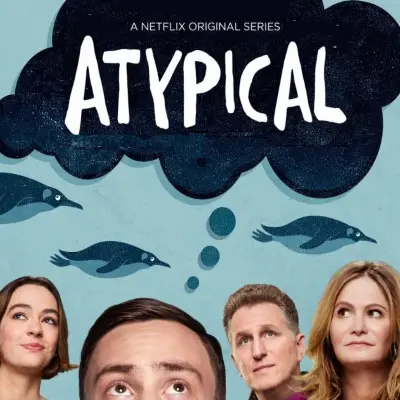Atypical's final season sticks the landing in its portrayal of life on the autism spectrum
-

"Watching one’s child strike out on their own is bittersweet for most parents," says Lorraine Ali of the fourth and final season of the Netflix series. "But for those of us who spent every waking hour helping our sons or daughters acclimate to a neurotypical world — from decoding mysterious social cues to tolerating the tactile assault of clothing tags to constantly standing guard against those who might try and tear them down because of their differences — it’s particularly heartbreaking and terrifying. The concluding 10 episodes of Atypical deftly tackle those fears and more, cementing the show’s legacy as one of the best series to deal with autism and its butterfly effect on family, friends and loved ones. At once hilarious and moving, irreverent and reaffirming, Season 4 aptly chronicles the final stages of Sam’s move toward self-determination — and the South Pole." Ali adds: "Atypical has been masterful at avoiding the preciousness that has often plagued other shows or films that have tried dramatize autism stories or create characters with developmental disabilities. The series cuts the tension and taboo with keen humor, often bordering on the impertinent, but Sam is never the butt of the joke. The risk paid off, and has allowed for ongoing gags that remind viewers that the Gardners are not the Cleavers...I’d like to give Atypical an award for capturing the bittersweet journey of raising a kid who’s different, from a mom like Elsa who has seen herself as a retaining wall between a cruel world and the complex soul that is her son. And with the series’ end, maybe I can loosen my grip just a little, as Elsa has, and let his journey of adulthood begin."
ALSO:
- Atypical has gained an emotional maturity and a new level of depth and warmth through its four seasons:
"It spins its many plates with skill," says Rebecca Nicholson, adding: "While the show does deal with big themes – it touches on cancer, death, disappointment and dementia – it handles them lightly and tenderly. Sam’s college friends, mostly played by actors with disabilities, provide much of the comic relief, and the decision to focus more on them this time is a smart one. Tal Anderson’s Sid, in particular, really comes into her own. Each episode asks its characters to learn something about themselves and about the world, which they inevitably do, and the resolution is invariably wholesome. In almost any other show, I would find this earnestness unbearable, but it says a lot about the charm of Atypical that it is feelgood and sweet, but never saccharine. I think that is because it seems entirely uncynical, and that lack of cynicism is rare and lovely."
- Atypical creator Robia Rashid says the whole season is about Sam exceeding his own expectations in every way: “The idea of potential and where your dreams can take you and Sam realizing that’s available to him was so cool to us, so that was sort of the starting point for this season," says Rashid.
- Rashid is content with Atypical's ending: “I did feel like we got to a good place with everybody," she says. "I felt like everybody’s ending was satisfying." Looking back on that final outing, many of the show’s themes and where it ends was “what we needed at the time,” Rashid concludes. “We needed messages of hope and journeys of adventure, and that’s kind of what Season 4 is.”
TOPICS: Atypical, Netflix, Robia Rashid, Autism, Series Finales
More Atypical on Primetimer: - Atypical has gained an emotional maturity and a new level of depth and warmth through its four seasons:
